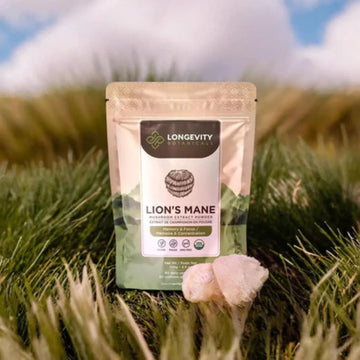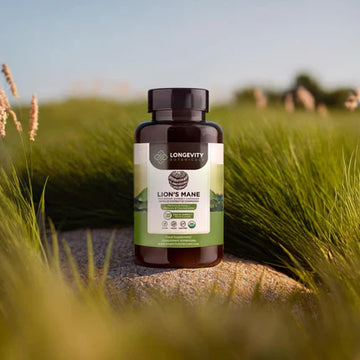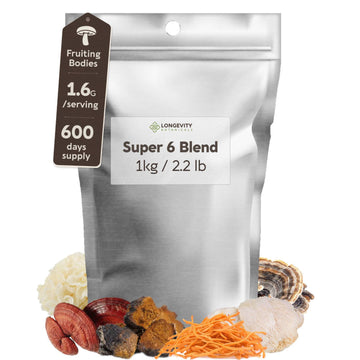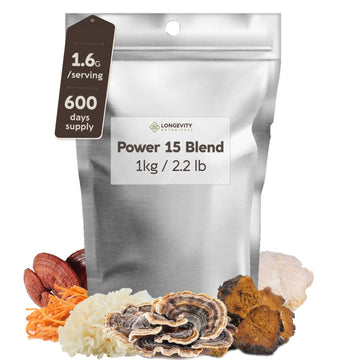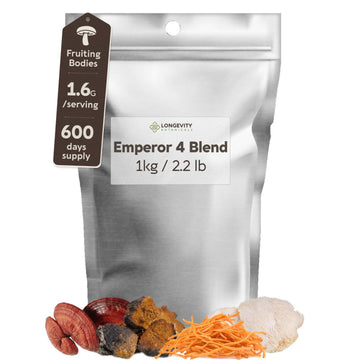Many people enjoy eating mushrooms for their flavor and health benefits. But some ask, "Can You Eat Lion’s Mane Raw?" This special mushroom has a unique look and offers various nutrients.
Eating it raw might seem simple, but there are things to consider.
Lion’s mane mushroom looks like a giant white pom-pom and is known for its support of brain health. In this article, we will discuss the safety of eating lion’s mane raw, its nutritional benefits, and the best ways to enjoy it.
Discover how to make the most of this delicate delicacy.
What is Lion's Mane Mushroom?
Lion's Mane Mushroom is a large, white fungus with long, shaggy spines. It looks like a lion's mane and belongs to the genus Hericium, including species like Hericium erinaceus and Hericium americanum.
Also called bearded tooth fungus and pom-pom mushroom, it grows on hardwood trees in North America, Europe, China, and Japan. Hugh Hale, founder of Longevity Botanicals, discovered its cognitive and anti-inflammatory benefits while studying herbology in China. Lion's Mane is prized for its unique texture and potential health benefits, making it a popular choice among mushroom supplement enthusiasts.
Can You Eat Lion’s Mane Raw?
Yes, you can eat Lion’s Mane mushroom raw. Make sure to clean it well and enjoy its unique taste and texture.
Safety considerations
Raw lion’s mane mushrooms contain chitin in their cell walls. Chitin can cause stomach upset or allergic reactions in some people. Cooking the mushroom breaks down chitin, making it easier to digest and safer to eat.
Many mushroom enthusiasts choose cooked lion’s mane to avoid these digestive issues. Eating raw lion’s mane may lead to gastrointestinal discomfort or other adverse effects. To ensure safety, it is best to consume lion’s mane mushrooms cooked rather than raw.
Nutritional benefits
Lion’s mane mushroom offers many nutritional benefits. It contains vitamins like thiamine, riboflavin, and niacin that help your body produce energy. Essential minerals such as manganese, zinc, and potassium support important functions in the body.
The mushroom’s dietary fiber aids digestion, while antioxidants fight free radicals and reduce inflammation. Compounds like hericenones and erinacines may help boost brain health by promoting the growth of nerve cells.
Including lion’s mane in your diet provides valuable nutrients and supports overall well-being.

Taste and texture comparison: Raw vs. Cooked
Transitioning from the nutritional benefits, let's explore how Lion's Mane mushroom differs in taste and texture when consumed raw versus cooked.
| Aspect | Raw | Cooked |
|---|---|---|
| Texture | Firm and fibrous | Tender and spongy with mild sweetness |
| Taste | Mild, earthy flavor | Flavor similar to crab or lobster |
| Aroma | Earthy with a subtle seafood undertone | Enhanced earthy and seafood aromas |
| Palatability | Less palatable due to fibrous texture | Improved palatability by breaking down chitin |
| Nutritional Bioavailability | Lower when consumed raw | Increased through cooking |
Health Benefits of Lion’s Mane Mushrooms
Lion's Mane mushrooms improve cognition, support digestive health, and reduce inflammation, offering significant health benefits—read on to learn more.
Cognitive improvement
Lion’s mane may boost cognition by supporting neuron growth. Compounds in the mushroom help brain health and can prevent dementia. Studies show it might slow Alzheimer’s symptoms and improve mental performance in older adults. Taking mane capsules could enhance your cognition and reduce anxiety and depression. The mushroom’s ability to promote nerve regeneration benefits the nervous system, making it a valuable dietary supplement for brain function.
Digestive health
Digestive health also gains from lion’s mane. It thickens mucus in the stomach lining, which may help protect against stomach ulcers. Traditional Chinese Medicine uses it for gastric health.
Studies on mice show that it might aid in diabetes management and fight stomach ulcers. This edible mushroom supports the gastrointestinal tract and overall digestive system.
Anti-inflammatory properties
Lion’s mane mushrooms contain powerful bioactive compounds that reduce inflammation. These compounds help ease pain and support overall health. Studies show lion’s mane may lower inflammation in the body, benefiting conditions like inflammatory bowel disease and protecting against stomach ulcers. 1 Its anti-inflammatory properties make it a valuable supplement for those managing chronic conditions.
Alternative Ways to Consume Lion’s Mane
Explore different ways to include Lion’s Mane in your meals, such as adding it to soups or sautés. You can also find Lion’s Mane in capsule or powder form for convenient use.
Cooking methods
Cooking lion’s mane mushrooms improves their taste and makes them easier to digest. Here are some effective cooking methods:
-
Sweating the Mushrooms
Chop the mushrooms and let them sweat to remove excess moisture. This step is essential for better flavor in dishes like soups and broths.
-
Sautéing with Avocado Oil
Use avocado oil for sautéing because it has a high smoke point and a neutral flavor. Cook the mushrooms on the stovetop for about 10 minutes until they are tender.
-
Adding to Soups and Broths
Incorporate lion’s mane into soups and broths. Cooking enhances their palatability and breaks down chitin, making them easier to eat.
-
Making Vegetarian California Rolls
Use cooked lion’s mane as a filling in vegetarian California rolls. The mushrooms add a subtle umami flavor and a unique texture.
-
Topping for Toast
Prepare lion’s mane mushrooms and use them as a topping for toast. This method highlights their meaty texture and rich taste.
-
Asian Garlic Noodles
Add sautéed lion’s mane to Asian garlic noodles. The mushrooms blend well with the flavors and provide a hearty addition to the dish.
These methods make lion’s mane mushrooms a versatile ingredient in various recipes, enhancing both flavor and nutritional value.
Supplements and extracts
Lion’s Mane supplements come in different forms. They fit various lifestyles and needs.
- Powder: Mix lion’s mane powder into smoothies or coffee. It blends easily and adds a nutritional boost.
- Capsules: Take lion’s mane capsules for convenience. They provide a consistent dose without the taste of mushrooms.
- Liquid Extracts: Use liquid extracts for fast absorption. Ritual Superfoods offers a Lion’s Mane Focus Elixir that is easy to add to drinks.
- Extraction Ratio: Extracts are made at an 8:1 ratio. This ensures a potent dose from a smaller amount of mushrooms.
- No Standard Dosage: There is no set dose due to limited studies. Follow the product’s instructions for best results.
- Quality Ingredients: Longevity Botanicals uses 100% fruiting bodies. Their extracts are certified organic for purity and safety.
- Supplement Benefits: Supplements may support cognitive and digestive health. They also offer anti-inflammatory properties.
Conclusion
Lion’s Mane offers many health benefits. Cooking them makes eating safer and tastier. They help improve your brain and digestion. Supplements are an easy way to add them to your routine.
Check out quality extracts for the best results. Start using Lion’s Mane today and boost your well-being.
FAQs
Can you eat lion's mane mushrooms raw safely?
Yes, you can eat lion's mane mushrooms raw. Raw lion's mane adds a subtle umami flavor to dishes. They are safe to eat raw or cooked. Cooking may enhance their mouthfeel and make them easier to digest. Always use fresh lion's mane mushrooms to ensure safety.
Are there any side effects of consuming lion's mane mushrooms?
Lion's mane mushrooms are generally safe, but some may experience side effects. Possible issues include digestive problems like peptic ulcer disease or hypoglycemia. It's important to consult with a healthcare provider before using lion's mane, especially if you have conditions like cardiovascular disease or are taking medication.
Is it better to eat lion's mane mushrooms raw or cooked for maximum benefits?
Both raw and cooked preparations of lion's mane mushrooms have benefits. Eating them raw preserves certain nutrients and adds a subtle flavor to dishes. Cooking lion's mane makes the mushrooms easier to digest and can enhance their health benefits. Choose the method that best fits your dietary needs and preferences.
